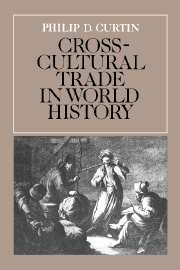Book contents
- Frontmatter
- Contents
- List of illustrations
- Preface
- 1 Trade diasporas and cross-cultural trade
- 2 Africa: incentives to trade, patterns of competition
- 3 Africa: traders and trade communities
- 4 Ancient trade
- 5 A new trade axis: the Mediterranean to China, circa 200 B.C. – A.D. 1000
- 6 Asian trade in Eastern seas, 1000–1500
- 7 The European entry into the trade of maritime Asia
- 8 Bugis, banians, and Chinese: Asian traders in the era of the great companies
- 9 Overland trade of the seventeenth century: Armenian carriers between Europe and East Asia
- 10 The North American fur trade
- 11 The twilight of the trade diasporas
- Bibliography
- Index
3 - Africa: traders and trade communities
Published online by Cambridge University Press: 15 March 2010
- Frontmatter
- Contents
- List of illustrations
- Preface
- 1 Trade diasporas and cross-cultural trade
- 2 Africa: incentives to trade, patterns of competition
- 3 Africa: traders and trade communities
- 4 Ancient trade
- 5 A new trade axis: the Mediterranean to China, circa 200 B.C. – A.D. 1000
- 6 Asian trade in Eastern seas, 1000–1500
- 7 The European entry into the trade of maritime Asia
- 8 Bugis, banians, and Chinese: Asian traders in the era of the great companies
- 9 Overland trade of the seventeenth century: Armenian carriers between Europe and East Asia
- 10 The North American fur trade
- 11 The twilight of the trade diasporas
- Bibliography
- Index
Summary
At first glance, there is no apparent reason why traders living in an alien society must necessarily live separately from their hosts, but physical segregation of this kind was almost universal. In part, this separation was necessary simply to preserve the cultural integrity of the trade community. Without barriers of some kind, the traders from abroad would likely disappear through assimilation into the host society within a generation or so; their capacity to act as cross-cultural brokers would then come to an end. Diaspora merchants needed contact with their hosts, but they also needed to keep their distance and enough of their original culture to serve as brokers for the traveling merchants from the original homeland. The host society also had reason to keep alien merchants at a distance. They were, after all, normally considered to be unpleasant people on the double qualification of being both merchants and foreigners – however profitable it might be to have them around when needed. The interests of the hosts and the strangers alike suggest that a slightly distant contact was the most desirable relationship between the two communities.
For northern Africa, this kind of physical and social separation went back to the dawn of historical knowledge, as we will see in the next chapter. At the beginning of the eighth century, the division of the Mediterranean basin between a Christian north and a Muslim south reinforced the traders' need for security. The result was the factory system, which provided for the physical segregation of aliens on either shore of the sea in special residences with attached warehouses, variously called fundaco or funduq or feitoria.
- Type
- Chapter
- Information
- Cross-Cultural Trade in World History , pp. 38 - 59Publisher: Cambridge University PressPrint publication year: 1984

